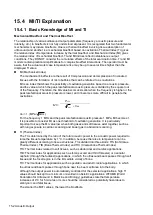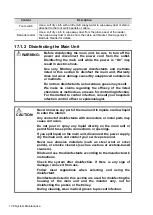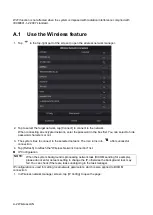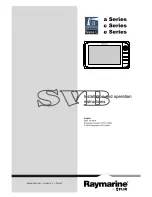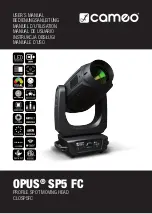
Guidance and Manufacturer's Declaration 16-5
TABLE 4
RECOMMENDED SEPARATION DISTANCES BETWEEN PORTABLE AND MOBILE RF
COMMUNICATION DEVICE AND THE SYSTEM
The system is intended for use in an electromagnetic environment in which radiated RF
disturbance are controlled. The customer or the user of system can help prevent
electromagnetic interference by maintaining a minimum distance between portable and mobile
RF communication equipment (transmitters) and system as recommended below, according to
the maximum output power of the communication equipment.
Rated Maximum
Output power of
Transmitter
(W)
Separation Distance According to Frequency of Transmitter
(m)
150kHz -80MHz
d
=
1.2√P
80MHz-800MHz
d
=
1.2√P
800MHz-2.5GHz
d
=
2.3√P
0.01
0.12
0.12
0.23
0.1
0.38
0.38
0.73
1
1.2
1.2
2.3
10
3.8
3.8
7.3
100
12
12
23
For transmitters at a maximum output power not listed above, the recommended separation
distanced in meters (m) can be determined using the equation applicable to the frequency of the
transmitter, where P is the maximum output power rating of the transmitter in watts (W)
according to the transmitter manufacturer.
If system image distortion occurs, it may be necessary to position system further from sources of
conducted RF noise or to install external power source filter to minimize RF noise to an
acceptable level.
Note 1 At 80 MHz and 800 MHz, the separation distance for the higher frequency range
applies.
Note 2 These guidelines may not apply in all situations. Electromagnetic propagation is
affected by absorption and reflection from structures, objects and people.
Cable sample
No.
Name
Cable length (m)
Shield or not
Remarks
1
AC inlet cable for the main unit
2.5
Not shielded
/
2
AC inlet cable for the trolley
2.5
Not shielded
/
3
Foot-switch control cable
2.8
Not shielded
/
4
Probe cable
2.2
Shielding
/
5
ECG Lead
1.4
Not shielded
/
Federal Communications Commission (FCC) Statement
The wireless module has been tested and found to comply with the limits for a class B digital
device, pursuant to Part 15 of the FCC rules. These limits are designed to provide reasonable
protection against harmful interference in a residential installation. This equipment generates, uses
and can radiate radio frequency energy and, if not installed and used in accordance with the
instructions, may cause harmful interference to radio communications. However, there is no
guarantee that interference will not occur in a particular installation. If this equipment does cause
harmful interference to radio or television reception, which can be determined by turning the
equipment off and on, the user is encouraged to try to correct the interference by one or more of
the following measures:
Summary of Contents for TE5
Page 1: ...TE7 TE5 Diagnostic Ultrasound System Operator s Manual Basic Volume ...
Page 2: ......
Page 6: ......
Page 12: ......
Page 24: ......
Page 36: ......
Page 54: ......
Page 110: ......
Page 115: ...Display Cine Review 6 5 6 Tap Return on the screen or tap Freeze to exit image compare ...
Page 120: ......
Page 124: ......
Page 156: ......
Page 174: ......
Page 192: ...12 18 Setup Select Advanced and do as follows Select MAPS and do as follows ...
Page 202: ...13 2 Probes and Biopsy C5 2s L12 4s L7 3s P4 2s L14 6s C11 3s L14 6Ns V11 3Ws P7 3Ts 7LT4s ...
Page 226: ...13 26 Probes and Biopsy NGB 034 NGB 035 ...
Page 250: ......
Page 272: ......
Page 276: ...A 4 Wireless LAN Tap Add Manually create a network profile to set ...
Page 282: ......
Page 318: ......
Page 322: ......
Page 323: ...P N 046 006959 07 1 0 ...






